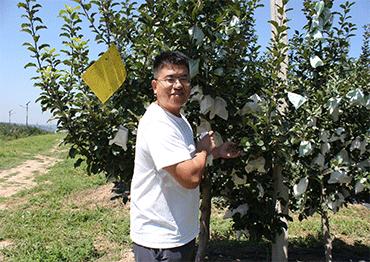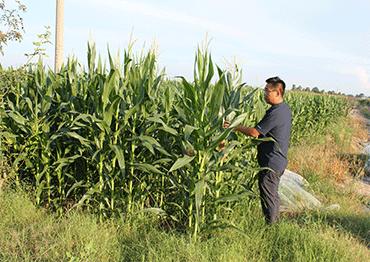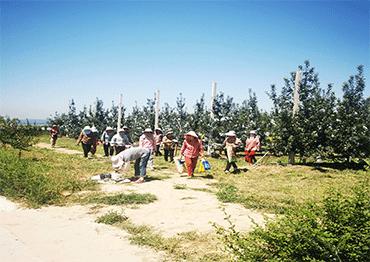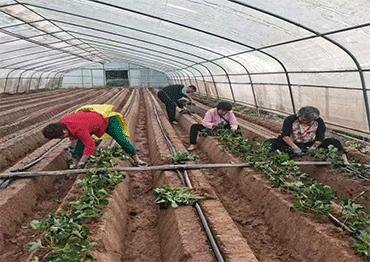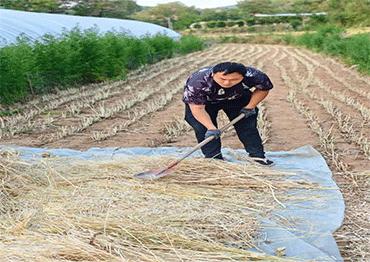For Fan, things started smoothly. But as more capital flowed into the market, she felt the pressure mounting.
Farmland rents skyrocketed – six times higher than in 2019 – and the market became saturated, driving down corn prices. Between 2019 and April this year, she rarely got a full night’s sleep. “There’s too much pressure – from the market, society and my parents. I’d often work until 2 or 3 am, and then get up to tend the fields, Fan said.
Last year, heavy rainfall impacted the quality of her crops, leaving her with 1.5 million yuan (US$211,600) in losses. But she has managed to break even this year, earning about 300,000 yuan (US$41,000), higher than the local average, and has nearly paid off her loans.
Still in debt, Cheng has learned to adopt a more realistic perspective. “Farming is fraught with risk, from weather and market shifts to policy changes and technology. Any one of them can be fatal.”
In the winter of 2017, heavy snow destroyed his plastic greenhouses, leading to another 500,000 yuan (US$70,535) loss. Two years later, excessive autumn rainfall ruined his 30 mu (2 hectares) of peaches, forcing him to sell at a loss of about 500,000 yuan (US$70,535).
“Income from farming is uncertain,” said Cheng, who has experimented with a wide variety of crops. Since 2019, he has been cautious about investing in fixed assets like equipment. “I realized farming alone wouldn’t turn things around,” he added.
Cheng warns young people to be prudent when choosing farming as a career. “It’s naïve to think investing several hundred thousand yuan in farming will make a fortune. Today’s farming requires big investment in fixed assets, seeds, fertilizers, labor, etc. It’s a high-investment, low-profit trade with a long payback period,” Cheng said.
He does not encourage friends or relatives to engage in farming and suggests young people be prudent when making the choice: “If they’re interested in the countryside, perhaps farming-related industries would be a better choice.”
During the interview, Cheng’s 4-yearold son was playing with his wife in another room. Cheng expressed gratitude for his wife’s patience over the years. Unlike most couples in their village, they haven’t bought an apartment in the county town. “I just hope for an ordinary life where my son can receive a better education in the county,” Cheng said.
In late August, a hailstorm nearly hit Zan Qiqi’s orchard, an increasingly common risk as extreme weather events become more frequent.
Despite his background in agronomy, which focuses on field crop production and soil management, the challenges have been immense. He and two friends pooled over 1 million yuan (US$141,070) to fund their orchard’s first few years, but the money quickly dried up. He borrowed more whenever possible, and his parents helped however they could.
Zan said his lowest point was when half of his seedlings died his first year, caused by bad soil stacking around the roots of the plants. “Every detail, from seed selection and field management to pest and disease control, affects the final outcome,” said Zan, who is already graying, though only in his 30s.
In 2023, Zan also battled apple scab, a fungus that infects both leaves and fruit. Persistent rains helped it spread. Even after spraying fungicide through the night, the blight halved his output and caused over 1 million yuan (US$141,070) in losses.
“Despite advanced technology... farmers like us are still at the mercy of the weather,” he said. Zan began selling apples in 2022, and is currently 1.5 million yuan (US$205,500) in debt.
Liao Hong, a farmer from Hunan Province, reduced her farmland by 100 mu (6.7 hectares) in 2023 after a series of setbacks and over 2 million yuan (US$274,000) in investments. “We started all over again, back to selecting seeds. The follow-on investment cost another 400,000 yuan (US$56,428),” Liao said.
A lively woman in her early 40s, Liao previously managed a restaurant and a wet market in Hunan’s capital of Changsha. She decided to return to the countryside in 2019, planting 260 mu (17 hectares) of snake gourd. But droughts, blizzards and lack of experience taught her painful lessons. “Farming is much more complicated than doing businesses in cities,” she said.
Cheng summed it up: “The countryside is no refuge... Here, your efforts might not be rewarded. Enthusiasm alone isn’t enough.”
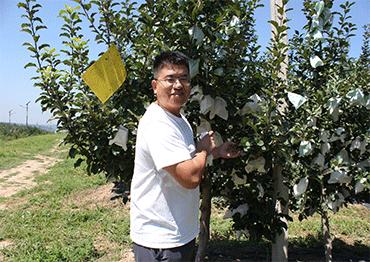
 Old Version
Old Version
